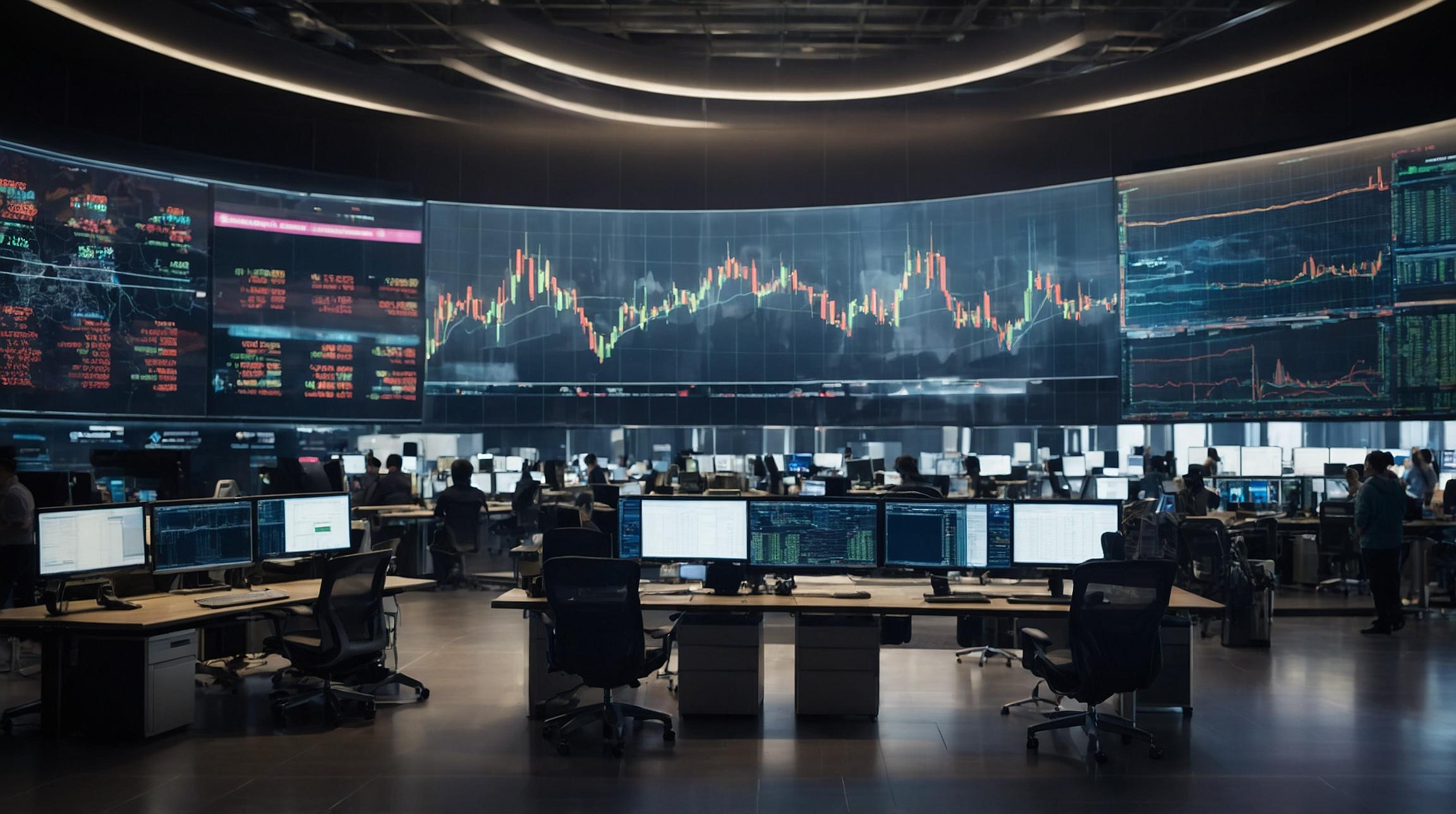The expected postponement of China’s export controls on rare earth minerals offers temporary relief to U.S. miners and global supply chains heavily reliant on these critical inputs. However, the underlying geopolitical tensions and strategic competition between the U.S. and China remain unresolved. !-- wp:paragraph -->
Contents
FinOracleAI — Market ViewAnalyst Insight: Delay Expected but Details PendingFinOracleAI — Market ViewAnalyst Insight: Delay Expected but Details PendingFinOracleAI — Market ViewChina’s Export Control Framework and Global Market InfluenceAnalyst Insight: Delay Expected but Details PendingFinOracleAI — Market ViewChina’s Export Control Framework and Global Market InfluenceAnalyst Insight: Delay Expected but Details PendingFinOracleAI — Market ViewPresident Trump Expresses Optimism Ahead of SummitChina’s Export Control Framework and Global Market InfluenceAnalyst Insight: Delay Expected but Details PendingFinOracleAI — Market ViewPresident Trump Expresses Optimism Ahead of SummitChina’s Export Control Framework and Global Market InfluenceAnalyst Insight: Delay Expected but Details PendingFinOracleAI — Market ViewU.S. Officials Signal Delay in Chinese Export RestrictionsPresident Trump Expresses Optimism Ahead of SummitChina’s Export Control Framework and Global Market InfluenceAnalyst Insight: Delay Expected but Details PendingFinOracleAI — Market ViewU.S. Officials Signal Delay in Chinese Export RestrictionsPresident Trump Expresses Optimism Ahead of SummitChina’s Export Control Framework and Global Market InfluenceAnalyst Insight: Delay Expected but Details PendingFinOracleAI — Market ViewRare Earth Stocks See Sharp Declines Amid Export Control Delay ExpectationsU.S. Officials Signal Delay in Chinese Export RestrictionsPresident Trump Expresses Optimism Ahead of SummitChina’s Export Control Framework and Global Market InfluenceAnalyst Insight: Delay Expected but Details PendingFinOracleAI — Market View
- Opportunities: Potential stabilization of rare earth supply chains; improved investor sentiment for U.S. miners; reduced risk of immediate tariffs or export restrictions.
- Risks: Prolonged uncertainty surrounding trade relations; possible resurgence of export controls post-delay; geopolitical volatility impacting mineral markets.
FinOracleAI — Market View
The expected postponement of China’s export controls on rare earth minerals offers temporary relief to U.S. miners and global supply chains heavily reliant on these critical inputs. However, the underlying geopolitical tensions and strategic competition between the U.S. and China remain unresolved. !-- wp:paragraph -->- Opportunities: Potential stabilization of rare earth supply chains; improved investor sentiment for U.S. miners; reduced risk of immediate tariffs or export restrictions.
- Risks: Prolonged uncertainty surrounding trade relations; possible resurgence of export controls post-delay; geopolitical volatility impacting mineral markets.
Analyst Insight: Delay Expected but Details Pending
Tobin Marcus, an analyst at Wolfe Research, noted in a client briefing dated October 26 that while details remain scarce, a delay in China’s rare earth export controls appears likely pending the outcome of the Trump-Xi summit. Marcus described the anticipated truce as preferable to alternative arrangements involving licensing agreements. !-- wp:paragraph -->FinOracleAI — Market View
The expected postponement of China’s export controls on rare earth minerals offers temporary relief to U.S. miners and global supply chains heavily reliant on these critical inputs. However, the underlying geopolitical tensions and strategic competition between the U.S. and China remain unresolved. !-- wp:paragraph -->- Opportunities: Potential stabilization of rare earth supply chains; improved investor sentiment for U.S. miners; reduced risk of immediate tariffs or export restrictions.
- Risks: Prolonged uncertainty surrounding trade relations; possible resurgence of export controls post-delay; geopolitical volatility impacting mineral markets.
Analyst Insight: Delay Expected but Details Pending
Tobin Marcus, an analyst at Wolfe Research, noted in a client briefing dated October 26 that while details remain scarce, a delay in China’s rare earth export controls appears likely pending the outcome of the Trump-Xi summit. Marcus described the anticipated truce as preferable to alternative arrangements involving licensing agreements. !-- wp:paragraph -->FinOracleAI — Market View
The expected postponement of China’s export controls on rare earth minerals offers temporary relief to U.S. miners and global supply chains heavily reliant on these critical inputs. However, the underlying geopolitical tensions and strategic competition between the U.S. and China remain unresolved. !-- wp:paragraph -->- Opportunities: Potential stabilization of rare earth supply chains; improved investor sentiment for U.S. miners; reduced risk of immediate tariffs or export restrictions.
- Risks: Prolonged uncertainty surrounding trade relations; possible resurgence of export controls post-delay; geopolitical volatility impacting mineral markets.
China’s Export Control Framework and Global Market Influence
Earlier this month, China unveiled a new framework to regulate rare earth exports, a move widely interpreted as a strategic warning to Western nations amid escalating geopolitical tensions. China remains the dominant force in the critical minerals sector, accounting for nearly 70% of global rare earth production and processing close to 90% of these materials worldwide. !-- wp:paragraph --> This dominance underscores China’s ability to import raw materials and refine them, reinforcing its leverage in global supply chains. !-- wp:paragraph -->Analyst Insight: Delay Expected but Details Pending
Tobin Marcus, an analyst at Wolfe Research, noted in a client briefing dated October 26 that while details remain scarce, a delay in China’s rare earth export controls appears likely pending the outcome of the Trump-Xi summit. Marcus described the anticipated truce as preferable to alternative arrangements involving licensing agreements. !-- wp:paragraph -->FinOracleAI — Market View
The expected postponement of China’s export controls on rare earth minerals offers temporary relief to U.S. miners and global supply chains heavily reliant on these critical inputs. However, the underlying geopolitical tensions and strategic competition between the U.S. and China remain unresolved. !-- wp:paragraph -->- Opportunities: Potential stabilization of rare earth supply chains; improved investor sentiment for U.S. miners; reduced risk of immediate tariffs or export restrictions.
- Risks: Prolonged uncertainty surrounding trade relations; possible resurgence of export controls post-delay; geopolitical volatility impacting mineral markets.
China’s Export Control Framework and Global Market Influence
Earlier this month, China unveiled a new framework to regulate rare earth exports, a move widely interpreted as a strategic warning to Western nations amid escalating geopolitical tensions. China remains the dominant force in the critical minerals sector, accounting for nearly 70% of global rare earth production and processing close to 90% of these materials worldwide. !-- wp:paragraph --> This dominance underscores China’s ability to import raw materials and refine them, reinforcing its leverage in global supply chains. !-- wp:paragraph -->Analyst Insight: Delay Expected but Details Pending
Tobin Marcus, an analyst at Wolfe Research, noted in a client briefing dated October 26 that while details remain scarce, a delay in China’s rare earth export controls appears likely pending the outcome of the Trump-Xi summit. Marcus described the anticipated truce as preferable to alternative arrangements involving licensing agreements. !-- wp:paragraph -->FinOracleAI — Market View
The expected postponement of China’s export controls on rare earth minerals offers temporary relief to U.S. miners and global supply chains heavily reliant on these critical inputs. However, the underlying geopolitical tensions and strategic competition between the U.S. and China remain unresolved. !-- wp:paragraph -->- Opportunities: Potential stabilization of rare earth supply chains; improved investor sentiment for U.S. miners; reduced risk of immediate tariffs or export restrictions.
- Risks: Prolonged uncertainty surrounding trade relations; possible resurgence of export controls post-delay; geopolitical volatility impacting mineral markets.
President Trump Expresses Optimism Ahead of Summit
Speaking aboard Air Force One en route to Japan, President Trump expressed confidence that the two nations would finalize a trade deal. He acknowledged having “a lot of respect for President Xi” and suggested a positive outcome was imminent. !-- wp:paragraph --> Previously, the White House had threatened to impose a 100% tariff on Chinese goods starting November 1, alongside export controls targeting critical software technologies. !-- wp:paragraph -->China’s Export Control Framework and Global Market Influence
Earlier this month, China unveiled a new framework to regulate rare earth exports, a move widely interpreted as a strategic warning to Western nations amid escalating geopolitical tensions. China remains the dominant force in the critical minerals sector, accounting for nearly 70% of global rare earth production and processing close to 90% of these materials worldwide. !-- wp:paragraph --> This dominance underscores China’s ability to import raw materials and refine them, reinforcing its leverage in global supply chains. !-- wp:paragraph -->Analyst Insight: Delay Expected but Details Pending
Tobin Marcus, an analyst at Wolfe Research, noted in a client briefing dated October 26 that while details remain scarce, a delay in China’s rare earth export controls appears likely pending the outcome of the Trump-Xi summit. Marcus described the anticipated truce as preferable to alternative arrangements involving licensing agreements. !-- wp:paragraph -->FinOracleAI — Market View
The expected postponement of China’s export controls on rare earth minerals offers temporary relief to U.S. miners and global supply chains heavily reliant on these critical inputs. However, the underlying geopolitical tensions and strategic competition between the U.S. and China remain unresolved. !-- wp:paragraph -->- Opportunities: Potential stabilization of rare earth supply chains; improved investor sentiment for U.S. miners; reduced risk of immediate tariffs or export restrictions.
- Risks: Prolonged uncertainty surrounding trade relations; possible resurgence of export controls post-delay; geopolitical volatility impacting mineral markets.
President Trump Expresses Optimism Ahead of Summit
Speaking aboard Air Force One en route to Japan, President Trump expressed confidence that the two nations would finalize a trade deal. He acknowledged having “a lot of respect for President Xi” and suggested a positive outcome was imminent. !-- wp:paragraph --> Previously, the White House had threatened to impose a 100% tariff on Chinese goods starting November 1, alongside export controls targeting critical software technologies. !-- wp:paragraph -->China’s Export Control Framework and Global Market Influence
Earlier this month, China unveiled a new framework to regulate rare earth exports, a move widely interpreted as a strategic warning to Western nations amid escalating geopolitical tensions. China remains the dominant force in the critical minerals sector, accounting for nearly 70% of global rare earth production and processing close to 90% of these materials worldwide. !-- wp:paragraph --> This dominance underscores China’s ability to import raw materials and refine them, reinforcing its leverage in global supply chains. !-- wp:paragraph -->Analyst Insight: Delay Expected but Details Pending
Tobin Marcus, an analyst at Wolfe Research, noted in a client briefing dated October 26 that while details remain scarce, a delay in China’s rare earth export controls appears likely pending the outcome of the Trump-Xi summit. Marcus described the anticipated truce as preferable to alternative arrangements involving licensing agreements. !-- wp:paragraph -->FinOracleAI — Market View
The expected postponement of China’s export controls on rare earth minerals offers temporary relief to U.S. miners and global supply chains heavily reliant on these critical inputs. However, the underlying geopolitical tensions and strategic competition between the U.S. and China remain unresolved. !-- wp:paragraph -->- Opportunities: Potential stabilization of rare earth supply chains; improved investor sentiment for U.S. miners; reduced risk of immediate tariffs or export restrictions.
- Risks: Prolonged uncertainty surrounding trade relations; possible resurgence of export controls post-delay; geopolitical volatility impacting mineral markets.
U.S. Officials Signal Delay in Chinese Export Restrictions
U.S. Treasury Secretary Scott Bessent indicated on NBC News’ “Meet The Press” that the United States and China are expected to reach an agreement avoiding the imposition of a new 100% tariff on Chinese imports. Concurrently, Beijing is anticipated to defer introducing stringent rare earth export controls as part of this broader trade deal. !-- wp:paragraph --> These comments precede a high-profile meeting scheduled for Thursday between Chinese President Xi Jinping and U.S. President Donald Trump, signaling a critical juncture in the bilateral trade relationship. !-- wp:paragraph -->President Trump Expresses Optimism Ahead of Summit
Speaking aboard Air Force One en route to Japan, President Trump expressed confidence that the two nations would finalize a trade deal. He acknowledged having “a lot of respect for President Xi” and suggested a positive outcome was imminent. !-- wp:paragraph --> Previously, the White House had threatened to impose a 100% tariff on Chinese goods starting November 1, alongside export controls targeting critical software technologies. !-- wp:paragraph -->China’s Export Control Framework and Global Market Influence
Earlier this month, China unveiled a new framework to regulate rare earth exports, a move widely interpreted as a strategic warning to Western nations amid escalating geopolitical tensions. China remains the dominant force in the critical minerals sector, accounting for nearly 70% of global rare earth production and processing close to 90% of these materials worldwide. !-- wp:paragraph --> This dominance underscores China’s ability to import raw materials and refine them, reinforcing its leverage in global supply chains. !-- wp:paragraph -->Analyst Insight: Delay Expected but Details Pending
Tobin Marcus, an analyst at Wolfe Research, noted in a client briefing dated October 26 that while details remain scarce, a delay in China’s rare earth export controls appears likely pending the outcome of the Trump-Xi summit. Marcus described the anticipated truce as preferable to alternative arrangements involving licensing agreements. !-- wp:paragraph -->FinOracleAI — Market View
The expected postponement of China’s export controls on rare earth minerals offers temporary relief to U.S. miners and global supply chains heavily reliant on these critical inputs. However, the underlying geopolitical tensions and strategic competition between the U.S. and China remain unresolved. !-- wp:paragraph -->- Opportunities: Potential stabilization of rare earth supply chains; improved investor sentiment for U.S. miners; reduced risk of immediate tariffs or export restrictions.
- Risks: Prolonged uncertainty surrounding trade relations; possible resurgence of export controls post-delay; geopolitical volatility impacting mineral markets.
U.S. Officials Signal Delay in Chinese Export Restrictions
U.S. Treasury Secretary Scott Bessent indicated on NBC News’ “Meet The Press” that the United States and China are expected to reach an agreement avoiding the imposition of a new 100% tariff on Chinese imports. Concurrently, Beijing is anticipated to defer introducing stringent rare earth export controls as part of this broader trade deal. !-- wp:paragraph --> These comments precede a high-profile meeting scheduled for Thursday between Chinese President Xi Jinping and U.S. President Donald Trump, signaling a critical juncture in the bilateral trade relationship. !-- wp:paragraph -->President Trump Expresses Optimism Ahead of Summit
Speaking aboard Air Force One en route to Japan, President Trump expressed confidence that the two nations would finalize a trade deal. He acknowledged having “a lot of respect for President Xi” and suggested a positive outcome was imminent. !-- wp:paragraph --> Previously, the White House had threatened to impose a 100% tariff on Chinese goods starting November 1, alongside export controls targeting critical software technologies. !-- wp:paragraph -->China’s Export Control Framework and Global Market Influence
Earlier this month, China unveiled a new framework to regulate rare earth exports, a move widely interpreted as a strategic warning to Western nations amid escalating geopolitical tensions. China remains the dominant force in the critical minerals sector, accounting for nearly 70% of global rare earth production and processing close to 90% of these materials worldwide. !-- wp:paragraph --> This dominance underscores China’s ability to import raw materials and refine them, reinforcing its leverage in global supply chains. !-- wp:paragraph -->Analyst Insight: Delay Expected but Details Pending
Tobin Marcus, an analyst at Wolfe Research, noted in a client briefing dated October 26 that while details remain scarce, a delay in China’s rare earth export controls appears likely pending the outcome of the Trump-Xi summit. Marcus described the anticipated truce as preferable to alternative arrangements involving licensing agreements. !-- wp:paragraph -->FinOracleAI — Market View
The expected postponement of China’s export controls on rare earth minerals offers temporary relief to U.S. miners and global supply chains heavily reliant on these critical inputs. However, the underlying geopolitical tensions and strategic competition between the U.S. and China remain unresolved. !-- wp:paragraph -->- Opportunities: Potential stabilization of rare earth supply chains; improved investor sentiment for U.S. miners; reduced risk of immediate tariffs or export restrictions.
- Risks: Prolonged uncertainty surrounding trade relations; possible resurgence of export controls post-delay; geopolitical volatility impacting mineral markets.
Rare Earth Stocks See Sharp Declines Amid Export Control Delay Expectations
Shares of several U.S.-listed rare earth mining companies plunged on Monday, reflecting investor concerns following reports that China is likely to postpone implementing export controls on critical minerals. This development is tied to ongoing trade negotiations between Washington and Beijing ahead of a pivotal bilateral summit. !-- wp:paragraph --> Critical Metals led the losses, tumbling over 17% in early trading. Other notable declines included USA Rare Earth down 12%, MP Materials falling 7.3%, and Trilogy Metals dropping 15%. Energy Fuels and NioCorp Developments also saw significant decreases of 14.7% and 9.5%, respectively. !-- wp:paragraph -->U.S. Officials Signal Delay in Chinese Export Restrictions
U.S. Treasury Secretary Scott Bessent indicated on NBC News’ “Meet The Press” that the United States and China are expected to reach an agreement avoiding the imposition of a new 100% tariff on Chinese imports. Concurrently, Beijing is anticipated to defer introducing stringent rare earth export controls as part of this broader trade deal. !-- wp:paragraph --> These comments precede a high-profile meeting scheduled for Thursday between Chinese President Xi Jinping and U.S. President Donald Trump, signaling a critical juncture in the bilateral trade relationship. !-- wp:paragraph -->President Trump Expresses Optimism Ahead of Summit
Speaking aboard Air Force One en route to Japan, President Trump expressed confidence that the two nations would finalize a trade deal. He acknowledged having “a lot of respect for President Xi” and suggested a positive outcome was imminent. !-- wp:paragraph --> Previously, the White House had threatened to impose a 100% tariff on Chinese goods starting November 1, alongside export controls targeting critical software technologies. !-- wp:paragraph -->China’s Export Control Framework and Global Market Influence
Earlier this month, China unveiled a new framework to regulate rare earth exports, a move widely interpreted as a strategic warning to Western nations amid escalating geopolitical tensions. China remains the dominant force in the critical minerals sector, accounting for nearly 70% of global rare earth production and processing close to 90% of these materials worldwide. !-- wp:paragraph --> This dominance underscores China’s ability to import raw materials and refine them, reinforcing its leverage in global supply chains. !-- wp:paragraph -->Analyst Insight: Delay Expected but Details Pending
Tobin Marcus, an analyst at Wolfe Research, noted in a client briefing dated October 26 that while details remain scarce, a delay in China’s rare earth export controls appears likely pending the outcome of the Trump-Xi summit. Marcus described the anticipated truce as preferable to alternative arrangements involving licensing agreements. !-- wp:paragraph -->FinOracleAI — Market View
The expected postponement of China’s export controls on rare earth minerals offers temporary relief to U.S. miners and global supply chains heavily reliant on these critical inputs. However, the underlying geopolitical tensions and strategic competition between the U.S. and China remain unresolved. !-- wp:paragraph -->- Opportunities: Potential stabilization of rare earth supply chains; improved investor sentiment for U.S. miners; reduced risk of immediate tariffs or export restrictions.
- Risks: Prolonged uncertainty surrounding trade relations; possible resurgence of export controls post-delay; geopolitical volatility impacting mineral markets.













